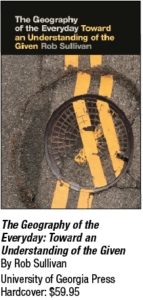 Anthropologists, psychologists, feminists and sociologists have long studied the “everyday,” the quotidian, the taken-for-granted; however, geographers have lagged behind in engaging with this slippery aspect of reality.
Anthropologists, psychologists, feminists and sociologists have long studied the “everyday,” the quotidian, the taken-for-granted; however, geographers have lagged behind in engaging with this slippery aspect of reality.
In The Geography of the Everyday, Rob Sullivan makes the case for geography as a powerful conceptual framework for seeing the everyday anew and for pushing back against its “givenness”: Its capacity to so fade into the background that it controls humans in dangerously unexamined ways.
Published by the University of Georgia Press, the book draws on a number of theorists (Foucault, Goffman, Marx, Lefebvre, Hagerstrand and others). Sullivan, a former lecturer in geography at the University of California, Los Angeles, unpacks the concepts and perceived realities that structure everyday life while grounding them in real-world cases such as Nigeria’s troubled oil network, the working poor in the U.S., China’s urban villages and ultra-high-end housing in London and Cairo.






